1853 A FRANCE Napoleon Bonaparte Antique French Gold 20 Francs Coin NGC i87389
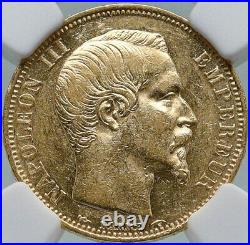
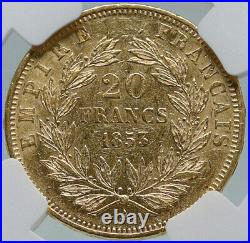
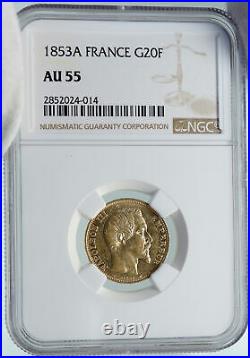
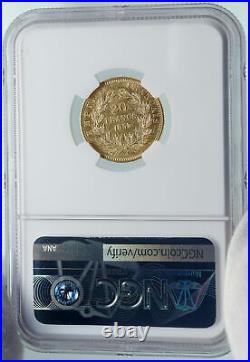
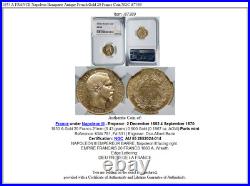

Item: i87389 Authentic Coin of. Emperor: 2 December 1852 - 4 September 1870 1853 A Gold 20 Francs 21mm (6.43 grams) 0.900 Gold 0.1867 oz.
AU 55 2852024-014 NAPOLEON III EMPEREUR BARRE, Napoleon III facing right. EMPIRE FRANCAIS 20 FRANCS 1860 A, Wreath. Edge Lettering: DIEU PROTEGE LA FRANCE. Louis-Napoléon Bonaparte (20 April 1808 - 9 January 1873) was the only President (1848-52) of the French Second Republic and, as Napoleon III, the Emperor (1852-70) of the Second French Empire.
He was the nephew and heir of Napoleon I. He was the first President of France to be elected by a direct popular vote.
He was blocked by the Constitution and Parliament from running for a second term, so he organized a coup d'état in 1851 and then took the throne as Napoleon III on 2 December 1852, the forty-eighth anniversary of Napoleon I's coronation. He remains the longest-serving French head of state since the French Revolution.
During the first years of the Empire, Napoleon's government imposed censorship and harsh repressive measures against his opponents. Some six thousand were imprisoned or sent to penal colonies until 1859. Thousands more went into voluntary exile abroad, including Victor Hugo. From 1862 onwards, he relaxed government censorship, and his regime came to be known as the Liberal Empire. Napoleon III is best known today for his grand reconstruction of Paris, carried out by his prefect of the Seine Baron Haussmann.He launched similar public works projects in Marseille, Lyon, and other French cities. Napoleon III modernized the French banking system, greatly expanded and consolidated the French railway system, and made the French merchant marine the second largest in the world.
He promoted the building of the Suez Canal and established modern agriculture, which ended famines in France and made France an agricultural exporter. He negotiated the 1860 Cobden-Chevalier free trade agreement with Britain and similar agreements with France's other European trading partners. Social reforms included giving French workers the right to strike and the right to organize. Women's education greatly expanded, as did the list of required subjects in public schools.In foreign policy, Napoleon III aimed to reassert French influence in Europe and around the world. He was a supporter of popular sovereignty and of nationalism. In Europe, he allied with Britain and defeated Russia in the Crimean War (1853-56).
His regime assisted Italian unification and, in doing so, annexed Savoy and the County of Nice to France; at the same time, his forces defended the Papal States against annexation by Italy. Napoleon doubled the area of the French overseas empire in Asia, the Pacific, and Africa. On the other hand, his army's intervention in Mexico aimed to create a Second Mexican Empire under French protection but ended in failure. Beginning in 1866, Napoleon had to face the mounting power of Prussia, as Chancellor Otto von Bismarck sought German unification under Prussian leadership.
In July 1870, Napoleon entered the Franco-Prussian War without allies and with inferior military forces. The French army was rapidly defeated and Napoleon III was captured at the Battle of Sedan. The French Third Republic was proclaimed in Paris, and Napoleon went into exile in England, where he died in 1873. France, officially the French Republic (French: République française), is a sovereign state comprising territory in western Europe and several overseas regions and territories. The European part of France, called Metropolitan France, extends from the Mediterranean Sea to the English Channel and the North Sea, and from the Rhine to the Atlantic Ocean.
France spans 640,679 square kilometres (247,368 sq mi) and has a total population of 67 million. It is a unitary semi-presidential republic with the capital in Paris, the country's largest city and main cultural and commercial centre. The Constitution of France establishes the state as secular and democratic, with its sovereignty derived from the people. During the Iron Age, what is now Metropolitan France was inhabited by the Gauls, a Celtic people. The Gauls were conquered in 51 BC by the Roman Empire, which held Gaul until 486.The Gallo-Romans faced raids and migration from the Germanic Franks, who dominated the region for hundreds of years, eventually creating the medieval Kingdom of France. France emerged as a major European power in the Late Middle Ages, with its victory in the Hundred Years' War (1337 to 1453) strengthening French state-building and paving the way for a future centralized absolute monarchy. During the Renaissance, France experienced a vast cultural development and established the beginning of a global colonial empire. The 16th century was dominated by religious civil wars between Catholics and Protestants (Huguenots).
France became Europe's dominant cultural, political, and military power under Louis XIV. French philosophers played a key role in the Age of Enlightenment during the 18th century. In 1778, France became the first and the main ally of the new United States in the American Revolutionary War. In the late 18th century, the absolute monarchy was overthrown in the French Revolution.
Among its legacies was the Declaration of the Rights of Man and of the Citizen, one of the earliest documents on human rights, which expresses the nation's ideals to this day. France became one of modern history's earliest republics until Napoleon took power and launched the First French Empire in 1804.
Fighting against a complex set of coalitions during the Napoleonic Wars, he dominated European affairs for over a decade and had a long-lasting impact on Western culture. Following the collapse of the Empire, France endured a tumultuous succession of governments: the monarchy was restored, it was replaced in 1830 by a constitutional monarchy, then briefly by a Second Republic, and then by a Second Empire, until a more lasting French Third Republic was established in 1870.
By the 1905 law, France adopted a strict form of secularism, called laïcité, which has become an important federative principle in the modern French society. France reached its territorial height during the 19th and early 20th centuries, when it ultimately possessed the second-largest colonial empire in the world.
In World War I, France was one of the main winners as part of the Triple Entente alliance fighting against the Central Powers. France was also one of the Allied Powers in World War II, but came under occupation by the Axis Powers in 1940. Following liberation in 1944, a Fourth Republic was established and later dissolved in the course of the Algerian War. The Fifth Republic, led by Charles de Gaulle, was formed in 1958 and remains to this day.
Following World War II, most of the empire became decolonized. Throughout its long history, France has been a leading global center of culture, making significant contributions to art, science, and philosophy.
It hosts Europe's third-largest number of cultural UNESCO World Heritage Sites (after Italy and Spain) and receives around 83 million foreign tourists annually, the most of any country in the world. France remains a great power with significant cultural, economic, military, and political influence. It is a developed country with the world's sixth-largest economy by nominal GDP and eight-largest by purchasing power parity.
According to Credit Suisse, France is the fourth wealthiest nation in the world in terms of aggregate household wealth. It also possesses the world's second-largest exclusive economic zone (EEZ), covering 11,035,000 square kilometres (4,261,000 sq mi).
French citizens enjoy a high standard of living, and the country performs well in international rankings of education, health care, life expectancy, civil liberties, and human development. France is a founding member of the United Nations, where it serves as one of the five permanent members of the UN Security Council. It is a member of the Group of 7, North Atlantic Treaty Organization (NATO), Organisation for Economic Co-operation and Development (OECD), the World Trade Organization (WTO), and La Francophonie.
France is a founding and leading member state of the European Union (EU). World-renowned expert numismatist, enthusiast, author and dealer in authentic ancient Greek, ancient Roman, ancient Byzantine, world coins & more. Ilya Zlobin is an independent individual who has a passion for coin collecting, research and understanding the importance of the historical context and significance all coins and objects represent. Send me a message about this and I can update your invoice should you want this method. Getting your order to you, quickly and securely is a top priority and is taken seriously here.Great care is taken in packaging and mailing every item securely and quickly. What is a certificate of authenticity and what guarantees do you give that the item is authentic? You will be very happy with what you get with the COA; a professional presentation of the coin, with all of the relevant information and a picture of the coin you saw in the listing. Additionally, the coin is inside it's own protective coin flip (holder), with a 2x2 inch description of the coin matching the individual number on the COA. Whether your goal is to collect or give the item as a gift, coins presented like this could be more prized and valued higher than items that were not given such care and attention to.
When should I leave feedback? Please don't leave any negative feedbacks, as it happens sometimes that people rush to leave feedback before letting sufficient time for their order to arrive.
The matter of fact is that any issues can be resolved, as reputation is most important to me. My goal is to provide superior products and quality of service. How and where do I learn more about collecting ancient coins? Visit the Guide on How to Use My Store.For on an overview about using my store, with additional information and links to all other parts of my store which may include educational information on topics you are looking for. This item is in the category "Coins & Paper Money\Coins: World\Europe\France". The seller is "highrating_lowprice" and is located in this country: US. This item can be shipped worldwide.
- Country/Region of Manufacture: France
- Certification Number: 2852024-014
- Certification: NGC
- Grade: AU 55
- Year: 1853
- Composition: Gold
- Denomination: 20 Francs
